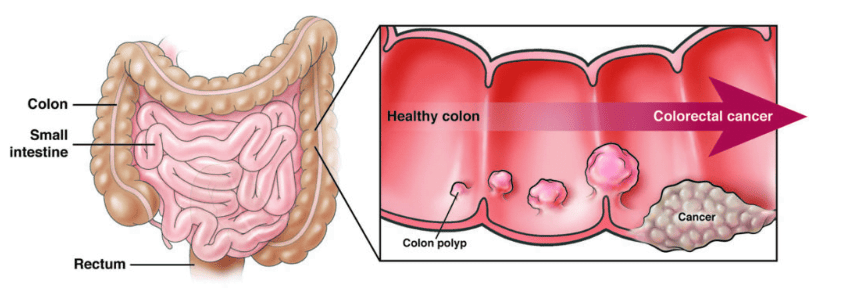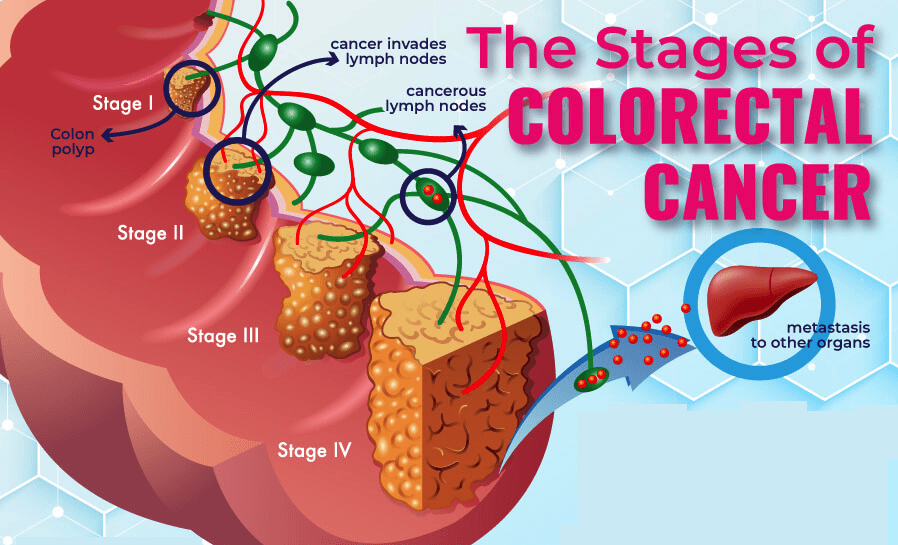Colon and rectal cancer that arises in the colon or rectum, which are sections of the large intestine, is referred to as colorectal cancer. It is among the most prevalent forms of cancer in the globe. One kind of cancer that begins in the cells lining the colon or rectum is colorectal cancer. Usually, it starts as a polyp, which is a growth on the rectum or colon’s inner lining. Certain polyps may eventually develop into cancer. The good news is that, when detected early on, colorectal cancer is generally curable and frequently prevented. The emergence of cancer often begins with polyps, which are abnormal growths on the colon’s or rectum’s inner lining. The majority of polyps are benign, meaning they are not malignant, but some can become so over time—usually years.

Many times referred to as colorectal cancer, colon and rectal cancer can result from a mix of lifestyle, environmental, and hereditary causes.
Polyps: Benign growths in the colon or rectum called polyps are frequently the first signs of colorectal cancer. Certain polyps may eventually develop into cancer. The chance of getting colorectal cancer is greatly decreased by routine screening examinations, such as colonoscopies, which can identify and remove polyps before they become malignant.
Family History: People who have an adenomatous polyp or colorectal cancer in their family are more vulnerable. If a parent, sibling, or child in your first degree of relation has been diagnosed with colorectal cancer, your risk goes up.
Non-Inherited Mutations: The majority of genetic mutations that cause colorectal cancer occur spontaneously over an individual’s lifespan. We don’t entirely understand why these mutations occurred.
Factors related to lifestyle: Certain lifestyle decisions may raise your risk. Among them are: 1. diet heavy in processed and red meats and poor in fiber. 2. excess weight and inactivity. 3. smoking. 4. excessive drinking of alcohol.
Inflammatory Bowel Disease (IBD): Prolonged, persistent inflammation of the intestines brought on by illnesses such as ulcerative colitis or Crohn’s disease might increase the risk of colorectal cancer.
It’s crucial to remember that while having these risk factors increases the likelihood of developing colorectal cancer, not everyone who has them will end up with the illness. Healthy lifestyle choices, family history knowledge, and routine screening can all help lower the risk of colorectal cancer or discover it early, when treatment is most effective.
Testing people who do not exhibit colon and rectal cancer symptoms in order to find precancerous polyps or early-stage cancer is known as colorectal cancer screening. Because early discovery can result in better results and more effective treatment, screening is crucial. The following are the main techniques for screening for colorectal cancer:
Screening for colorectal cancer is essential for several important reasons:
Lower Mortality Rates: The chance of passing away from colorectal cancer is considerably decreased by routine screening. Screening contributes to the reduction of cancer-related fatalities by identifying and eliminating polyps or discovering the illness early.
Manageability: Early-stage colorectal cancer frequently exhibits no symptoms. By screening, cancer can be found early on, when it is more controllable and its symptoms are less severe.
To sum up, colorectal cancer screening saves lives by identifying cancer at an early stage or averting it completely by removing precancerous polyps. It is a preventative action that people may take to safeguard their health and wellbeing, highlighting the significance of routine screenings as advised by medical professionals.
The degree of the malignancy at diagnosis determines the prognosis for colorectal cancer. This is a summary of the methods used to treat colorectal cancer:
Cancer in its Early Stages:
Cancer in a later stage:
Additional Elements Impacting Curability:
The stage, location, general health, and treatment preferences of a patient are all factors that influence the treatment plan for colorectal cancer. Surgery, chemotherapy, targeted therapy, and immunotherapy are just a few of the advanced therapeutic options that have greatly improved colorectal cancer patient outcomes and survival rates. Achieving a cure or long-term remission requires early discovery through screening and appropriate treatment.
While they are not the same, colorectal and colon cancer are connected. Below is a summary of the main distinctions:
Colon and Rectal Cancer:
Colorectal Cancer:
Comparabilities:
It’s crucial to discuss any concerns you may have with your doctor regarding colon cancer or colorectal cancer. They are able to evaluate your risk factors, suggest suitable screening tests, and respond to any queries you might have.

The majority of colorectal cancer patients are treated mostly with surgery, particularly if the disease is discovered early. To stop the disease from spreading, the malignant portion of the colon or rectum, as well as occasionally the surrounding lymph nodes, must be removed.
Types of Surgery for Colorectal Cancer:
1. Removal of the colon (colectomy):
2. Surgery for rectal cancer, or rectal resection:
3. Minimally Invasive Surgery:
Here are a few more things to think about:

By incorporating this cutting-edge technology into a Colorectal Surgeon practice, the surgeon is able to provide patients with a range of benefits:
Surgical Methods:
An outline of typical surgical methods for treating colon and rectal cancer is provided below:
Robotic Surgery: A robotic surgical system is used in this minimally invasive procedure. During surgery, the physician uses tiny instruments to move robotic arms while seated at a console for improved dexterity and visualization. Although robotic surgery is a more recent technology and is more expensive, it might be appropriate in some circumstances.
Stage and Location of the Cancer: Both the cancer’s stage (or extent) and its location within the colon or rectum have a major bearing on the surgical strategy. Treatment for tumors in their early stages may differ from that for cancers in their mature stages. The size, position, and possible involvement of surrounding lymph nodes will all be taken into account by the surgeon.
Most cases of colorectal cancer are treated primarily with surgery, especially when the disease is discovered early. The location and stage of the cancer determine the sort of surgery that is needed
Colectomy: The removal of the colon, whole or in part.
Rectal resection: The rectum is extracted.
Adjuvant therapy: used following surgery to lower the chance of cancer returning. This could consist of:
Chemotherapy: Kills cancer cells all across the body with strong medications.
High-energy rays are used in radiation therapy to target and kill cancer cells.
Neoadjuvant therapy: administered before to surgery with the goal of shrinking tumors and possibly simplifying their removal. Radiation therapy or chemotherapy might be used for this.
Medication that targets particular weaknesses in cancer cells is known as targeted therapy. These could be applied to certain genetic alterations or in more advanced phases.
Immunotherapy: Aids in the immune system’s ability to identify and combat cancerous cells. This is a newer field of colorectal cancer treatment.
Techniques to eliminate tumors by applying heat or by severing their blood supply are known as embolizing and ablation. For certain cases or malignancies that are incurable, they may be employed.
Clinical trials are investigations that examine novel and potentially effective treatment modalities. Think about these as a possibility if they make sense for your circumstances.
Recall that your Colorectal Surgeon suggested course of treatment will vary depending on the type, stage, and location of your cancer as well as your general health.
Dr. Bhatt offers the best management strategy for colon and rectal cancer, customized to your unique needs and preferences. Make an appointment for a consultation to talk about your situation and ask questions with Dr. Bhatt’s colorectal surgeons.
As a board-certified general surgeon and colorectal surgeon, Dr. Astha Bhatt is dedicated to providing the best medical care possible for patients with colon and rectal cancer. Dr. Bhatt performs all colorectal cancer-related surgeries in Broward County, Florida. She specializes in minimally invasive procedures using robotic surgery systems for colon and rectal cancer.
Reputable general and colorectal surgeon Dr. Astha Bhatt practices in Pompano Beach, Florida and Broward County, Florida. She specializes in less invasive procedures including robotic colorectal surgery. When it comes to detecting and treating illnesses pertaining to the colon, rectum, and anus, including colorectal cancer and the best surgery for colon and rectal cancer, Dr. Bhatt is well-known for her skills. She is renowned for her utilization of cutting-edge surgical tools, strong patient communication skills, and caring approach.